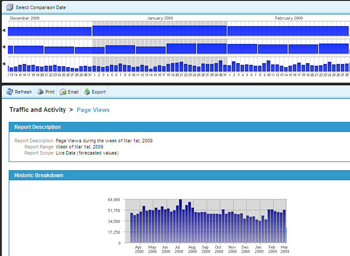Using web analytics to increase your traffic
 Hat tip to Staff writer Correy E. Stephenson of Lawyers USA:
Hat tip to Staff writer Correy E. Stephenson of Lawyers USA:
As the Internet becomes an ever-increasing source of clients, it's extremely valuable to understand how and why potential clients arrive at your website or blog.
Web analytics – the information included in the site's browser log – can provide those answers.
To access the information in a reader-friendly format, you can buy software that translates the weblog into a readable format; some Internet service providers also provide the service for a price.
"Any lawyer can do this, but in my experience, lawyers never check their web stats or web analytics because they underestimate the power of the web," explained Larry Bodine, business development advisor at Chicago-based Larry Bodine Marketing and owner of the site www.LawMarketing.com.
Your firm's website "is your most important marketing vehicle," Bodine said, because that's how consumers search for information that is available 24 hours a day, 365 days a year.
"If you do it right, a website will generate more leads for you than anything else, but you have to check the web analytics to find out."
Here are some key items to check when evaluating your site's web analytics:
• Referrals
An important source of information is referrals, or how a visitor to your website found you, whether from a Google search or a link from another blog.
"Referrals are the thing I'd be looking at," said Kevin O'Keefe, president of LexBlog and author of "Real Lawyers Have Blogs."
For a blog, it's important to know where your traffic is coming from – for example, if another blogger referenced something you recently said or if people stopped by after you were on Twitter, O'Keefe said.
And "ideally, you should see that Google is your number one referrer," Bodine said. If Google isn't sending a lot of visitors your way, it's time to evaluate your search engine optimization.
• Unique visitors and page views
"People talk about how many hits your website gets, but a hit is irrelevant," Bodine said. "The key measure is the number of unique visitors, which is one person coming to your site."
If the same visitor comes to your site 10 times over the course of a month, that would be one unique visitor.
However, if that visitor clicks through several pages of your website, they will generate multiple page views, another helpful measurement of how much information the visitor finds useful on your site.
The number of "page views is always going to be a much bigger number," Bodine noted. "But keep a hawk eye on unique visitors."
• Content
Analytics can tell you what pages visitors are reading the most. On a law firm website, typically the homepage gets the most visits, Bodine said, followed by the biographies of the lawyers and any discussion of the firm's practice areas.
"But chances are nobody is reading the firm history or the links page," he noted.
Most analytics programs will let you drill down to the most visited page, or in the case of a blog, the most popular post.
"I've noticed on some of the better small firm sites, they have a FAQ section with really good explanations, like 'Here is what happens in a divorce case,' or 'Here are 10 things you should not discuss with your insurance company after a personal injury,'" Bodine noted.
Analytics will also be able to tell you "what key words or key phrases bring people to particular pages," O'Keefe said, which can help you shape content accordingly.
Steve Matthews, founder and principal of Stem Legal, a web marketing company for lawyers based in British Columbia, Canada, noted that it's important to monitor which search terms are effective because they may change and you could get a different ranking for "PI lawyer in Louisiana" versus "Louisiana PI attorney."
And be sure to update your website frequently, Matthews said, as fresh content is a key component in maintaining a good search engine ranking.
• Trends
Keep an eye out for your website's usage trends from month to month, Bodine suggested.
If traffic is going up or down, try to figure out why. Likewise, if a certain blog post or news item gets high numbers, try to figure out why so you can duplicate the results – maybe readers are interested in a certain topic that you should cover more frequently, Matthews said.
"If you check the analytics and see that 150 people visited the site just for one particular item, then you should expand your presence on that topic and create the opportunity for more visitors," he said.
Alternatively, "if you check the list of the top 25 most visited pages on your site and if certain pages consistently don't make the list, get rid of them," Bodine said. "You've created space that bores people."



